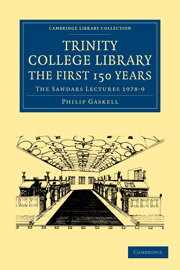Book contents
- Frontmatter
- Contents
- Lists of illustrations and plans
- Preface
- Terms and conventions
- Abbreviations
- 1546–1600
- 1 College libraries in the sixteenth century
- 2 The libraries of Michaelhouse and the King's Hall
- 3 The establishment of Trinity College Library
- 4 The need for books at Trinity in the sixteenth century
- 5 The College Library in the mid-sixteenth century
- 6 The College Library in 1600
- 7 The development of the collection up to 1600
- 8 Private libraries
- 1601–1695
- APPENDIXES
- Index
2 - The libraries of Michaelhouse and the King's Hall
Published online by Cambridge University Press: 05 August 2011
- Frontmatter
- Contents
- Lists of illustrations and plans
- Preface
- Terms and conventions
- Abbreviations
- 1546–1600
- 1 College libraries in the sixteenth century
- 2 The libraries of Michaelhouse and the King's Hall
- 3 The establishment of Trinity College Library
- 4 The need for books at Trinity in the sixteenth century
- 5 The College Library in the mid-sixteenth century
- 6 The College Library in 1600
- 7 The development of the collection up to 1600
- 8 Private libraries
- 1601–1695
- APPENDIXES
- Index
Summary
The ancient colleges of Michaelhouse and the King's Hall each had a library at the time of their amalgamation and refoundation as Trinity College in 1546. All that we know about the Michaelhouse collection is that the College was given three divinity books and two law books by the Founder in 1327; many books by William de Gotham, Master in 1387; works of Augustine and Hugh of St Victor by John Ottringham, Master, by 1454; 200 books by John Yotton, Master in 1492–3; seven books by four donors in the early sixteenth century; and six printed divinity books by William Filey DD, perhaps c.1525, of which three are still in Trinity College Library. At the time of its dissolution, moreover, Michaelhouse commemorated about 150 other benefactors, some of whom, perhaps, had also given books to the College. All this – and especially John Yotton's enormous donation – suggests that Michaelhouse had a large library by the 1520s; and it is likely, in view of the clerical character of the society, that it was a collection chiefly of divinity books.
Where Michaelhouse kept its books, however, we do not know. We have no Michaelhouse buildings records, and the buildings themselves were all pulled down long ago. All that is left are Trinity's sixteenthcentury demolition and building accounts, and three perspective views of Cambridge made in the later sixteenth century when about half of the old Michaelhouse buildings were still standing, but none of these documents so much as hint at where the Library was located.
- Type
- Chapter
- Information
- Trinity College Library. The First 150 YearsThe Sandars Lectures 1978–9, pp. 11 - 18Publisher: Cambridge University PressPrint publication year: 2010First published in: 1980



